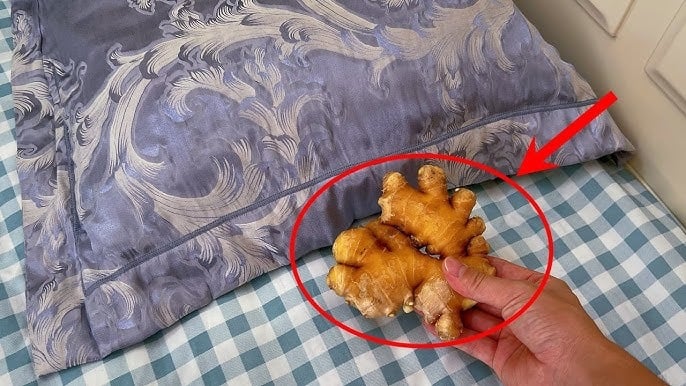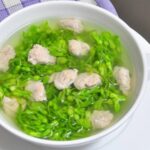What is the benefit of placing a ginger root at the bedside?

One of the handy tips many people use is to place a ginger root at their bedside.
This simple trick offers several advantages:
Sedative properties, aiding sleep
One of the primary reasons why people put ginger at their bedside is its calming effect, promoting better sleep. The aroma of ginger has a soothing influence on the nerves, relaxing the mind, and reducing stress and anxiety. Having ginger by your pillow can create a pleasant atmosphere, making it easier to fall asleep and improving sleep quality.
Air purification
In addition to enhancing sleep, ginger also acts as an odor neutralizer and air purifier. Placing ginger at the bedside helps eliminate unpleasant smells in the room, creating a more pleasant environment. Furthermore, ginger has antibacterial properties, inhibiting the growth of bacteria and mold, thus contributing to cleaner air.
Relieving nasal congestion
Those who frequently suffer from colds and nasal congestion may find relief by placing ginger at their bedside. The spice’s aroma helps clear the nasal passages, and its anti-inflammatory properties ease breathing. A 2020 study revealed that ginger possesses anti-allergic and anti-inflammatory capabilities, making the daily inhalation of its scent beneficial to overall health.
Enhancing libido
Scientific research indicates that ginger’s aroma comprises zingiberene and bisabolene, which contribute to its distinctive spicy fragrance. This scent reduces feelings of loneliness and increases desire, inspiring couples to engage in more intimate activities. Thus, placing ginger at the bedside can kindle the flames of passion between partners.
Repelling insects
Another benefit of keeping ginger at the bedside is its ability to repel insects, particularly mosquitoes. While the distinctive aroma of ginger is pleasing to humans, it elicits fear in certain insects. For households with young children, using ginger as a mosquito repellent is a safe alternative to chemical products, minimizing potential health risks.
Optimizing the placement of ginger at the bedside
While many people place a whole ginger root at their bedside, this may not be the most effective approach. To maximize the release of its aroma, it is recommended to slice the ginger into thin pieces or chop it finely and place it in a cloth bag, securely tied at the top.
Alternatively, you can reuse disposable masks by cutting up the ginger and placing it inside, using the earloops to secure the mask; hang this ginger pouch at the bedside or under the pillow to diffuse its fragrance.
Precautions when consuming ginger

What is the reason behind the popularity of placing a ginger root at the bedside?
Principle one: Moderation is key
During summer, our bodies tend to lose more water. As ginger is inherently spicy and hot, it should not be consumed in excess. Whether cooking or making tea, a few slices of ginger are sufficient; refrain from overindulging in this ingredient.
Principle two: Even good things have their limitations
Fresh ginger boiled with brown sugar is a common remedy for colds, flu, and stomach ailments caused by cold temperatures.
However, ginger itself is hot in nature and is only suitable for treating illnesses caused by cold energy. Therefore, those suffering from heatstroke or heat-induced colds should refrain from using ginger-based remedies.
Principle three: Don’t peel the ginger
Many people, when preparing ginger, tend to peel it, believing it to be more hygienic. However, removing the outer layer diminishes its effectiveness.
Principle four: Discard spoiled ginger
Ginger that has deteriorated (bruised, rotten, or sprouted) can produce potent toxins, leading to cell necrosis and potentially causing severe illnesses such as liver or esophageal cancer.
Principle four: Ginger is not for everyone
Due to its spicy and hot nature, ginger may not be suitable for everyone. It is not recommended for individuals with yin deficiency and excess fire, internal heat, boils, sores, or open wounds.
Similarly, those with certain lung conditions (pneumonia, lung abscess, lung pus, or tuberculosis); stomach ulcers; kidney problems (ruptured or inflamed kidneys); gallbladder inflammation; diabetes; or hemorrhoids should refrain from excessive ginger consumption.





































